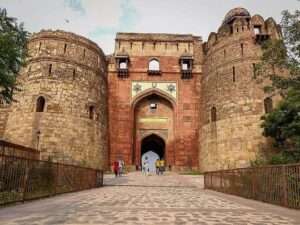Throughout the year, Duryodhana’s spies had been traveling around the world continuously, hoping to find the Pandavas or at least some trace of them. But until then, their searches had been fruitless. One after another they returned to Hastinapura without news.
One day in the council chamber people started talking about the Pandavas again.
“My most skilled emissaries have returned,” said Duryodhana, “without having found any clues. Perhaps my cousins died in the forest from hardship, disease, or perhaps they fell victim to some Rakshasas. If so, our worries would have ended.”
“Don’t fool yourself,” Bhishma replied, “Pandu’s sons are not the kind to die in a forest. Prepare for their return.”
Duryodhana had always been annoyed by the way Bhishma and Drona talked about the Pandavas; according to how they described them, it seemed that they were the only brave ones in the world.
“If they have not died in the forest, we will meet them fearlessly on the battlefield,” he replied harshly.
Everyone was perfectly aware that there were a few days to go until the thirteen years expired, after which Yudhisthira’s commitment would be fulfilled, and the Pandavas would be free to take revenge for the wrongs suffered. And everyone knew well what the reactions of Bhima, Arjuna, the twins, Dhristadyumna, Krishna, and Yudhisthira himself would be. Nothing would stop them. For this reason, the elders, first of all Dhritarastra, tried to persuade Duryodhana to ask for peace when the cousins returned to regain their kingdom. But his attitude gave no hope for anything good, so a deep pessimism began to spread among them.
The next day, the informants who had been sent to Matsya also returned and recounted the latest events concerning Kichaka and the strange massacre of his family. This was all too obvious not to arouse suspicion. Duryodhana and his closest friends met in secret.
“In all of Bharata-varsha you can count the men who could have faced Kichaka,” the Kurava mused aloud, “and one of them is Bhima. Friends, maybe they have been hiding in Virata’s place and we have found them.”
Among Duryodhana’s most trusted friends was Susharma, the king of the Trigarta, who harbored a visceral hatred for the Pandavas, particularly for Arjuna, whom he had been subjected to during the military campaign for the Rajasuya.
“The news of Kichaka’s death makes me happy,” he said, “because this offers us new perspectives. We have always tried to conquer the kingdom of Virata, but we have never succeeded precisely because of the value of this general. I am convinced too that the Pandavas are hiding there. I propose to force them to betray themselves, to show themselves, so that we can send them back to the forests. I have a plan; listen.”
And Susharma proposed his diabolical idea: his troops would invade the territory of Matsya from the south, taking away the herds and forcing Virata to rush to defend the properties of his citizens. And the next day, while that part of the kingdom was virtually unprotected, the Kurus would attack from the north. In this way, the Pandavas would have felt compelled to intervene to help Virata, to whom they owed a debt of gratitude. If that strategy worked, they could be recognized.
After studying all the details and solving the many tactical problems, everyone agreed with the project. It was decided that the Trigarta would have eight days to prepare and the Kurus would attack the next day.
The preparations for the war expedition began.
This is a section of the book “Maha-bharata, Vol. 1”.
To buy the complete book, click above
Post view 492 times




Leave a Reply